#leo paul samuel robert
Explore tagged Tumblr posts
Text
Joan McCarter at Daily Kos:
Sen. Dick Durbin, chair of the Judiciary Committee, announced Wednesday that his committee will take up legislation next month to impose ethics reform on the Supreme Court. “The Supreme Court is in an ethical crisis of its own making due to the acceptance of lavish gifts from parties with business before the Court that several Justices have not disclosed,” Durbin tweeted, referring to the latest ProPublica story about Justice Samuel Alito. “The reputation and credibility of the Court are at stake,” he continued.
The reputation and credibility of the court are already shot at this point. Polling has consistently shown a deterioration in public trust in the institution, with large majorities saying they don’t have confidence in the court. The slide started well before revelations from ProPublica about the ethical lapses of Justices Clarence Thomas and Alito, but public confidence plummeted when the court overturned abortion rights last year and has been falling ever since. Durbin did give a very broad hint to Chief Justice John Roberts; that Roberts could still avoid having Congress dictate how to do his job if he would just “take the lead and bring Supreme Court ethics in line with all other federal judges.” At this point, however, merely telling the justices they have to abide by the code of ethics that all lower courts have to live by isn’t going to be enough. [...]
A code of ethics for the Supreme Court is a good starting place, but it has to be seen just as that—the beginning of reform. There has to be reform beyond imposing a code of ethics because the court as it is now is corrupted. The Brennan Center just released a paper detailing one solid reform proposal, limiting justices’ terms to 18 years and ensuring that each president gets two appointments to the court per presidential term. It would create a revolving core of justices, giving those whose terms were up the chance to take senior status and still participate as needed either on the Supreme Court or on a lower court. That’s one very good idea. It wouldn’t just restore balance to court, it would reduce the malign influence of actors like Leonard Leo, the villainous architect of the current conservative Supreme Court, and also the matchmaker for conservative justices and their billionaire benefactors. It would also defang groups like the forced birthers, because court appointments would lose some potency as political issues. Every president getting two appointments per term makes those appointments less powerful, which would be a good thing. In the immediate term, however, the reality of this court has to be dealt with. Even if Roberts relents and imposes a code of ethics, chances are good at least two of the justices will ignore it. Their influence has to be diluted, and the best way to do that right now is by expanding the court. The legislation to do just that exists now. That should be the next move on Durbin’s part, taking up that bill.
Sen. Richard Durbin (D-IL) is correct here on the Supreme Court in regards to ProPublica's latest piece on Justice Samuel Alito's ethics breach: "The reputation and credibility of the Court are at stake."
#Dick Durbin#SCOTUS#Ethics#Samuel Alito#Clarence Thomas#Senate Judiciary Committee#US Senate#Judiciary#John Roberts#Harlan Crow#Paul Singer#Leonard Leo#SCOTUS Nominations#Judicial Nominations#Term Limits#Court Reform#Courts#SCOTUS Ethics Crisis
12 notes
·
View notes
Note
What are some movies that every aspiring cinephile should watch?
battleship potemkin (sergei eisenstein, 1926)
city lights (charlie chaplin, 1931)
M (fritz lang, 1931)
freaks (tod browning, 1932)
brief encounter (david lean, 1945)
out of the past (jacques tourneur, 1947)
the third man (carol reed, 1949)
late spring (yasijuro ozu, 1949)
kiss me deadly (robert aldrich, 1955)
a man escaped (robert bresson, 1956)
touch of evil (orson welles, 1958)
la dolce vita (federico fellini, 1960)
peeping tom (michael powell, 1960)
man who shot liberty valance (john ford, 1962)
the exterminating angel (luis buñuel, 1962)
shock corridor (samuel fuller, 1963)
kwaidan (masaki kobayashi, 1964)
dragon inn (king hu, 1967)
playtime (jacques tati, 1967)
once upon a time in the west (sergio leone, 1968)
two-lane blacktop (monte hellman, 1971)
aguirre, wrath of god (werner herzog, 1972)
touki bouki (djibril diop mambety, 1973)
the conversation (francis ford coppola, 1974)
the passenger (michelangelo antonioni, 1975)
nashville (robert altman, 1975)
the killing of a chinese bookie (john cassavetes, 1976)
mikey and nicky (elaine may, 1976)
sorcerer (william friedkin, 1977)
days of heaven (terrence malick, 1978)
blow out (brian de palma, 1981)
8 diagram pole fighter (lau kar-leung, 1984)
mishima: a life in four chapters (paul schrader, 1985)
tampopo (jūzō itami, 1985)
blue velvet (david lynch, 1986)
something wild (jonathan demme, 1986)
landscape in the mist (theo angelopoulos, 1988)
sonatine (takeshi kitano, 1993)
salaam cinema (mohsen makhmalbaf, 1995)
fallen angels (wong kar-wai, 1995)
taste of cherry (abbas kiarostami, 1997)
cure (kiyoshi kurosawa, 1997)
the thin red line (terrence malick, 1999)
beau travail (claire denis, 1999)
yi yi (edward yang, 2000)
all about lily chou chou (shunji iwai, 2001)
memories of murder (bong joon-ho, 2003)
dogville (lars von trier, 2003)
tropical malady (apichatpong weerasethakul, 2004)
silent light (carlos reygadas, 2007)
sparrow (johnnie to, 2008)
holy motors (leos carax, 2012)
phoenix (christian petzold, 2014)
personal shopper (oliver assayas, 2016)
345 notes
·
View notes
Text
IWTV Season 2 Sources & References
Season 1 here (these lists are updated regularly)
Season 3 here
Cited by the Writer’s Room/Cast:
The Ethnic Avante-Garde: Minority Cultures and World Revolution by Steven S. Lee
Paris Journal 1944-1955 by Janet Flanner (Genet)
The Vampire: A Casebook by Alan Dundes
Anne Rice’s Vampire Chronicles: An Alphabettery
The Fly cited by Jacob Anderson
King Lear by Shakespeare cited by Rolin Jones
The Third Man (1949) cited by Levan Akin
An American in Paris by George Gershwin (1928) cited by Daniel Hart
Giovanni’s Room cited by Jacob Anderson
References:
Melmoth the Wanderer by Charles Maturin
Sebastien Melmoth by Oscar Wilde
Ode to a Nightingale by Keats
Amadeus (1984)
The Lost Boys (1987)
Gaslight (1944)
Batman
Casablanca (1942)
Now, Voyager (1942)
Moulin Rouge (2001)
The Phantom of the Opera
Les Vampires (1915)
Dracula (1931) credit to @vampchronicles_ on twt
Le Triomphe de L’amour by Pierre de Marivaux
Existentialism is a Humanism by Jean Paul Sartre
Les Liaisons Dangereuses by Pierre Choderlos de Laclos
Romeo and Juliet by William Shakespeare
How to Win Friends and Influence People by Dale Carnegie
Hamlet by William Shakespeare
Vampire’s Kiss (1988) credit to @talesfromthecrypts
Les Morts ont tous le Meme Peau by Boris Vian credit to @greedandenby
The Most Dangerous Game by Richard Connell
Waiting for Godot by Samuel Barclay Beckett credit to @rorscachisgay on twt
An Enemy of the People by Ibsen
Anna Karenina by Leo Tolstoy
Vie de Voltaire by Marquis Condorcet
Simone de Beauvoir: A Critical Introduction by Edward Fullbrook and Kate Fullbrook credit to @iwtvfanevents
Nightwood by Djuna Barnes credit to @iwtvfanevents
Beloved by Toni Morrison
Artists, Art, and Salons:
R-26
Palma Vecchio
Andre Fougeron
Elsa Triollet
Fred Stein
Lisette Model
Gordon Parks
Miguel Barcelo
Taxidermied Javelina by Chris Roberts-Antieau
Ai WeiWei (wallpaper)
David Hockney (Lemons)
Wols
The Kiss of Judas by Jakob Smits
Salome by Louis Icart
Ophelia by John Everett Millais
Shelter by Peter Macon
The Kiss by Edvard Munch
The Vampire or Love and Pain by Edvard Munch credit @iwtvasart
Ruiter on Horse by Reiger Stolk credit @ iwtvasart
Portrait of Frank Burty Haviland by Modigliani credit @iwtvasart
Self-Seers II (Death and Man) by Egon Schiele credit to @90sgreggaraki
The Sleep of Reason Produces Monsters by Goya
Aicha by Felix Vallotton
Cariatide by Modigliani
Nature Morte Au Pain Et Au Cocteau by Louis Marcoussis
Untitled by Julio Gonzalez
Embrace by Mikulas Galanda
Trees on a Mountain Slope by Ernst Kirchner
Landscape Paris by Henry Lyman Sayen
Tabac 56 by Oscar Garcia
Spirituals by Lillian Richter Reynolds
Movie & Play Posters on set (in chronological order by year):
Tarzan and his Mate (1934)
Avec le Sourire (1936)
Les Deux Gosses (1936)
Le Jour Se Leve (1939) about a man who commits murder as a result of a love triangle and locks himself in his apartment recounting the details as the police attempt to arrest him. Credit to @laisofhyccara
Nuit de Décembre (1940)
Mademoiselle Swing (1942) about a girl who follows a troupe of swing musicians to Paris.
Les Enfents du Paradis (1945) about a woman with many suitors including an actor and an aristocrat.
Fantomas (1946) about a sadistic criminal mastermind. This version includes a hideout in the catacombs where he traps people.
Quai des Orfevres (1947) watch here
Monsieur Vincent (1947)
Le Cafe du Cadran (1947) about a wife’s affair with a violinist.
La Kermesse Rouge (1947) film about a jealous artist who locks up his younger wife and a fire breaks out while she’s trapped.
Morts Sans Sepulture by Jean-Paul Sartre (play) also published in English translations as “The Victors” or “Men Without Shadows” about resistance fighters captured by Vichy soldiers struggling not to give up information.
Mon Faust by Paul Valery (play)
Musical Influences:: @greedandenby collected all music used in Season 2 here.
Henry Cowell
Meredith Monk
Howling’ Wolf
Shirley Temple
Jason Lindner Big Band
The Teeth
Carlos Salzedo
Alice Coltrane
Thelonius Monk
David Lang
Caroline Shaw
Gadfly by Shostakovich (for Raglan James)
musical career of Martha Argerich

#iwtv#season 2#given that the posters are starting to come out of Prague I decided to start compiling sources and references in one place#Set design#production design#iwtv art
297 notes
·
View notes
Text
For the answers, pay attention to Leonard Leo. He is the judicial kingmaker responsible for the list from which Trump selected Justices Neil Gorsuch, Brett Kavanaugh and Amy Coney Barrett. Leo has shaped this Court and acted effectively to keep its Republican justices from abandoning his – and their – sectarian-right vision of America.
. . .
Here’s how ProPublica described the current cultural conditions that Leo seeks to overturn:[Leo] sees a nation plagued with ills . . . like environmental, social and governance, or ESG, policies sweeping corporate America. A member of the Roman Catholic Church, he intends to wage a broader cultural war against . . . “vile and immoral current-day barbarians, secularists and bigots” who demonize people of faith and move society further from its “natural order.”
. . .
We have learned from reporting just how comfortable the cocoon was. For Alito, free flights to Alaska salmon fishing, courtesy of Leo’s connections to billionaire Paul Singer. For Thomas, $4 million of gifts, including luxury private jet and yacht travel to foreign destinations, private tuition for a child he raised, home buying and a custom RV, much of it again through Leo’s connection to Harlan Crow, another right-wing billionaire.
. . .
In that vein, within the cocoon is also a shared political theory: that the path to cultural salvation runs most immediately through what Federalist society types call a “unitary executive” – an imperial president – committed to achieving their turn-back goals even through anti-majoritarian means.
That theory holds that a president’s power over the executive branch must be unchecked, especially by Congress. Its most fierce practitioner and developer in the Republican Justice Department 40 years ago was none other than Samuel Alito. John Roberts was there, too.
Trump v. United States is the unitary executive theory on steroids – officially, a president can do no wrong. Congress’ authority to contain the chief executive through ordinary criminal statutes is neutered. A president committed to his own power and to a Christian nation can complete a far-right, religio-political revolution.
2 notes
·
View notes
Photo
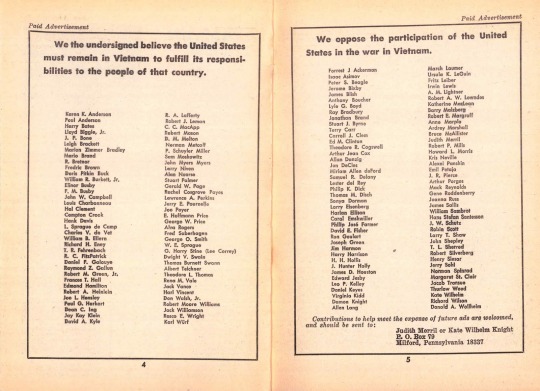
Vietnam War - Galaxy Science Fiction Magazine, June 1968
Sourced from: http://natsmusic.net/articles_galaxy_magazine_viet_nam_war.htm
Transcript Below
We the undersigned believe the United States must remain in Vietnam to fulfill its responsibilities to the people of that country.
Karen K. Anderson, Poul Anderson, Harry Bates, Lloyd Biggle Jr., J. F. Bone, Leigh Brackett, Marion Zimmer Bradley, Mario Brand, R. Bretnor, Frederic Brown, Doris Pitkin Buck, William R. Burkett Jr., Elinor Busby, F. M. Busby, John W. Campbell, Louis Charbonneau, Hal Clement, Compton Crook, Hank Davis, L. Sprague de Camp, Charles V. de Vet, William B. Ellern, Richard H. Eney, T. R. Fehrenbach, R. C. FitzPatrick, Daniel F. Galouye, Raymond Z. Gallun, Robert M. Green Jr., Frances T. Hall, Edmond Hamilton, Robert A. Heinlein, Joe L. Hensley, Paul G. Herkart, Dean C. Ing, Jay Kay Klein, David A. Kyle, R. A. Lafferty, Robert J. Leman, C. C. MacApp, Robert Mason, D. M. Melton, Norman Metcalf, P. Schuyler Miller, Sam Moskowitz, John Myers Myers, Larry Niven, Alan Nourse, Stuart Palmer, Gerald W. Page, Rachel Cosgrove Payes, Lawrence A. Perkins, Jerry E. Pournelle, Joe Poyer, E. Hoffmann Price, George W. Price, Alva Rogers, Fred Saberhagen, George O. Smith, W. E. Sprague, G. Harry Stine (Lee Correy), Dwight V. Swain, Thomas Burnett Swann, Albert Teichner, Theodore L. Thomas, Rena M. Vale, Jack Vance, Harl Vincent, Don Walsh Jr., Robert Moore Williams, Jack Williamson, Rosco E. Wright, Karl Würf.
We oppose the participation of the United States in the war in Vietnam.
Forrest J. Ackerman, Isaac Asimov, Peter S. Beagle, Jerome Bixby, James Blish, Anthony Boucher, Lyle G. Boyd, Ray Bradbury, Jonathan Brand, Stuart J. Byrne, Terry Carr, Carroll J. Clem, Ed M. Clinton, Theodore R. Cogswell, Arthur Jean Cox, Allan Danzig, Jon DeCles, Miriam Allen deFord, Samuel R. Delany, Lester del Rey, Philip K. Dick, Thomas M. Disch, Sonya Dorman, Larry Eisenberg, Harlan Ellison, Carol Emshwiller, Philip José Farmer, David E. Fisher, Ron Goulart, Joseph Green, Jim Harmon, Harry Harrison, H. H. Hollis, J. Hunter Holly, James D. Houston, Edward Jesby, Leo P. Kelley, Daniel Keyes, Virginia Kidd, Damon Knight, Allen Lang, March Laumer, Ursula K. LeGuin, Fritz Leiber, Irwin Lewis, A. M. Lightner, Robert A. W. Lowndes, Katherine MacLean, Barry Malzberg, Robert E. Margroff, Anne Marple, Ardrey Marshall, Bruce McAllister, Judith Merril, Robert P. Mills, Howard L. Morris, Kris Neville, Alexei Panshin, Emil Petaja, J. R. Pierce, Arthur Porges, Mack Reynolds, Gene Roddenberry, Joanna Russ, James Sallis, William Sambrot, Hans Stefan Santesson, J. W. Schutz, Robin Scott, Larry T. Shaw, John Shepley, T. L. Sherred, Robert Silverberg, Henry Slesar, Jerry Sohl, Norman Spinrad, Margaret St. Clair, Jacob Transue, Thurlow Weed, Kate Wilhelm, Richard Wilson, Donald A. Wollheim.
21 notes
·
View notes
Text
What was read 2023
The Lottery & Other Stories - Shirley Jackson (1949~)
A Life Standing Up - Steve Martin (2007)
Blood Meridian - Cormac McCarthy (1985)
Licks of Love -John Updike (2000)
Lovesickness Collection - Junji Ito (2011)
Flowers for Algernon - Daniel Keyes (1966)
The Anarchy The relentless rise of the East India Company - William Dalrymple (2019)
The Wisdom of Insecurity - Alan W.Watts (1951)
War and Peace - Leo Tolstoy (1869)
The Course of Love - Alain de Botton (2016)
Tender is the Night - F Scott Fitzgerald (1934)
Housekeeping - Marilynne Robinson (1980)
Moby Dick - Herman Melville (1851)
A Faint Heart (1848)White Nights (1848) A Little Hero (1857)An Unpleasant Predicament (1862) The Crocodile (1865) Bobok (1873) A Gentle Spirit/The Meek One* (1876) T1877) Fyodor Dostoevsky
The Maltese Falcon - Dashiell Hammett (1929)
Haunted - Chuck Palahniuk (2005)
The Name of the Rose - Umberto Eco (1980/3)
Diary - Chuck Palahniuk (2003)
Darkness Visible - William Styron (1990)
The Poorhouse Fair - John Updike (1958)
The Sound and the Fury - William Faulkner (1929)
The First Forty-Nine Stories - Ernest Hemingway (1939)
Mythos - Stephen Fry (2017)
The Good Earth - Pearl S. Buck (1931)
The Road to Wigan Pier - George Orwell (1936)
The House of the Dead - Fyodor Dostoevsky (1861)
Walden - Henry David Thoreau (1854)
The Gambler - Fyodor Dostoevsky (1866)
Normal People - Sally Rooney (2018)
Joy in the Morning - P. G. Wodehouse (1947)
After Dark - Haruki Murakami (2004)
The Lodger - Marie Belloc Lowndes (1913)
The Thing Around Your Neck - Chimamanda Ngozi Adichie (2009)
The Right Stuff - Tom Wolfe (1979)
Family Happiness - Leo Tolstoy (1859)
The Death of Ivan Ilyich - Leo Tolstoy (1866)
The Kreutzer Sonata - Leo Tolstoy (1889)
The Devil - Leo Tolstoy (1911)
Nausea - Jean-Paul Sartre (1938)
True History of the Kelly Gang - Peter Carey (2000)
Foucault’s Pendulum - Umberto Eco (1988/9)
Inferno - Dante Alighieri (~1308-1321)
Iliad - Homer (Samuel Butler translation 1898)
Carry On, Jeeves - P.G. Wodehouse (1925)
The Passenger - Cormac McCarthy (2022)
Stella Maris - Cormac McCarthy (2022)
Fear: Trump in the White House - Bob Woodward (2018)
Rubber Balls and Liquor - Gilbert Gottfried (2011)
kiss me like a stranger* - Gene Wilder (2005)
The Adventures of Auguie March - Saul Bellow (1953)
Rickles’ Book A memoir - Don Rickles (2007)
The ‘Rosy Crucifixion’ Trilogy. Sexus - Henry Miller (1949)
The Heart of a Dog - Milhaud Bulgakov (1925)
Dracula - Bram Stoker (1897)
The Grapes of Wrath - John Steinbeck (1939)
Albert & the Whale - Philip Hoare (2021)
A Waiter in Paris - Edward Chisholm (2022)
The Road to Oxiana - Robert Byron (1937)
3 notes
·
View notes
Text

Léo-Paul Samuel Robert (1851-1923), Woman with a Harp Via: https://arthur.io/art/leo-paul-robert/woman-with-a-harp
4 notes
·
View notes
Text
THE 236 GREATEST PERSONALITIES IN THE ENTIRE KNOWN HISTORY/COLLECTIVE CONSCIOUSNESS OF THIS WORLD! (@INDIES)
ie. THE 236 GREATEST PERSONALITIES IN WORLD HISTORY! (@INDIES)
Rajesh Khanna
Lionel Messi
Leonardo Da Vinci
Online Indie
Muhammad Ali
Joan of Arc
William Shakespeare
Vincent Van Gogh
J. K. Rowling
David Lean
Nadia Comaneci
Diego Maradona
Wolfgang Amadeus Mozart
Meena Kumari
Julius Caesar
Harrison Ford
Ludwig Van Beethoven
William W. Cargill
Fritz Hoffmann-La Roche
Samuel Curtis Johnson
Sam Walton
John D. Rockefeller
Andrew Carnegie
Roy Thomson
Tim Berners-Lee
Marie Curie
James J. Hill
Cornelius Vanderbilt
Roman Polanski
Samuel Slater
J. P. Morgan
Cary Grant
Dmitri Mendeleev
John Harvard
Alain Delon
Ramakrishna Paramhansa (Official God)
The Lumiere Brothers, Auguste & Louis
Carl Friedrich Benz
Michelangelo
Maharishi Mahesh Yogi
Ramana Maharishi
Mark Twain
Swami Sri Yukteswar Giri
Bruce Lee
Bhagwan Krishna (Official God)
Charlemagne
Rene Descartes
John F. Kennedy
Bhagwan Ganesha (Official God)
Walt Disney
Albert Einstein
Nikola Tesla
Alfred Hitchcock
Pythagoras
William Randolph Hearst
Cosimo de’ Medici
Johann Sebastian Bach
Alec Guinness
Nostradamus
Christopher Plummer
Archimedes
Jackie Chan
Guru Dutt
Amma Karunamayi/ Mata Parvati (Official God)
Peter Sellers
Gerard Depardieu
Joseph Safra
Robert Morris
Sean Connery
Petr Kellner
Aristotle Onassis
Usain Bolt
Jack Welch
Alfredo di Stefano
Elizabeth Taylor
Michael Jordan
Paul Muni
Steven Spielberg
Louis Pasteur
Ingrid Bergman
Norma Shearer
Dr. B. R. Ambedkar
Ayn Rand
Jesus Christ (Official God)
Luciano Pavarotti
Alain Resnais
Frank Sinatra
Allah (Official God)
Richard Nixon
Charlie Chaplin
Thomas Alva Edison
Alexander Graham Bell
Wright Brothers
Arjun (of Bhagwan Krishna’s Gita)
Jim Simons
George Lucas
Swami Sri Lahiri Mahasaya
Carl Lewis
Brett Favre
Helen Keller
Bernard Mannes Baruch
Buddha (Official God)
Hugh Grant
K. L. Saigal
Roger Federer
Rash Behari Bose
Tiger Woods
William Blake
Jesse Owens
Claude Miller
Bernardo Bertolucci
Subhash Chandra Bose
Satyajit Ray
Hippocrates
Chiang Kai-Shek
John Logie Baird
Geeta Dutt
Raphael (painter)
Bhagwan Shiva (Official God)
Radha (Ancient Krishna devotee)
George Orwell
Jorge Paulo Lemann
Catherine Deneuve
Pierre-Auguste Renoir
Bill Gates
Bhagwan Ram (Official God)
Michael Phelps
Michael Faraday
Audrey Hepburn
Dalai Lama
Grace Kelly
Mikhail Gorbachev
Vladimir Putin
Galileo Galilei
Gary Cooper
Roger Moore
John Huston
Blaise Pascal
Humphrey Bogart
Rudyard Kipling
Samuel Morse
Wayne Gretzky
Yogi Berra
Barry Levinson
Patrice Chereau (director)
Jerry Lewis
Louis Daguerre
James Watt
Henri Rousseau
Nikita Krushchev
Jack Dorsey
Dev Anand
Elia Kazan
Alexander Fleming
David Selznick
Frank Marshall
Viswanathan Anand
Major Dhyan Chand
Swami Vivekananda
Felix Rohatyn
Sam Spiegel
Anand Bakshi
Victor Hugo
Bhagwan Sri Sathya Sai Baba (Official God)
Steve Jobs
Srinivasa Ramanujam
Lord Hanuman
Stanley Kubrick
Giotto
Voltaire
Diego Velazquez
Ernest Hemingway
Francis Ford Coppola
Michael Douglas
Kirk Douglas
Mario Lemieux
Kishore Kumar
James Stewart
Douglas Fairbanks
Confucius
Babe Ruth
Raj Kapoor
Titian aka Tiziano Vecelli
El Greco
Francisco de Goya
Jim Carrey
Mohammad Rafi
Steffi Graf
Pele
Gustave Courbet
Rani Laxmibai of Jhansi
Milos Forman
Steve Wozniak
Georgia O’ Keeffe
Mala Sinha
Aryabhatta
Magic Johnson
Patanjali
Leo Tolstoy
Tansen
Henry Fonda
Albrecht Durer
Benazir Bhutto
Cal Ripken Jr
Samuel Goldwyn
Mumtaz (actress)
Panini
Nicolaus Copernicus
Pablo Picasso
George Clooney
Olivia de Havilland
Prem Chand
Imran Khan
Pete Sampras
Ratan Tata
Meerabai (16th c. Krishna devotee)
Queen Elizabeth II
Pope John Paul II
James Cameron
Jack Ma
Warren Buffett
Romy Schneider
C. V. Raman
Aung San Suu Kyi
Benjamin Netanyahu
Frank Capra
Michael Schumacher
Steve Forbes
Paramhansa Yogananda
Tom Hanks
Kamal Amrohi
Hans Holbein
Shammi Kapoor
Gerardus Mercator
Edith Piaf
Bhagwan Shirdi Sai Baba (Official God) .
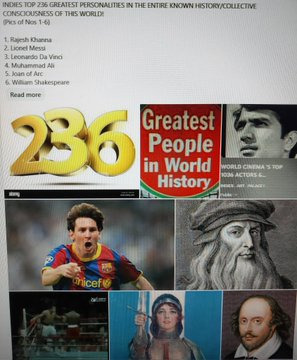
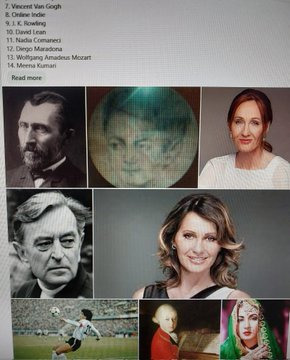
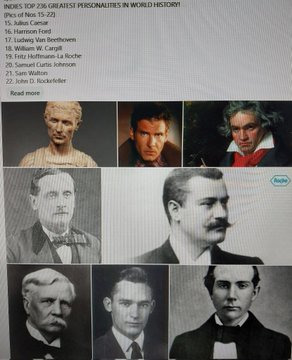
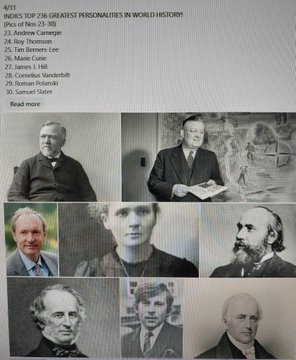
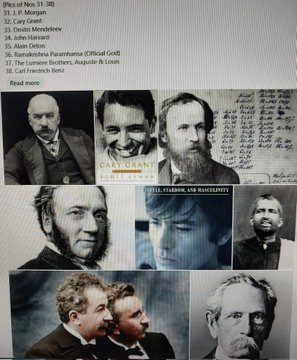

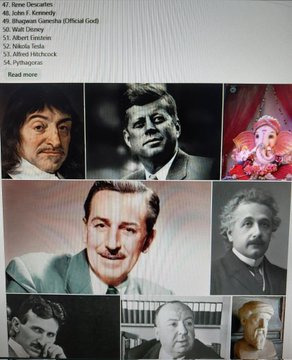
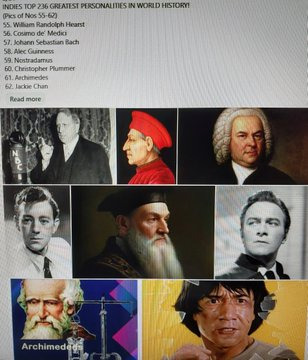
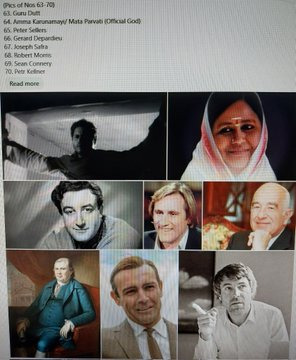
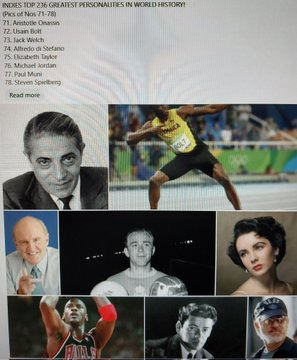
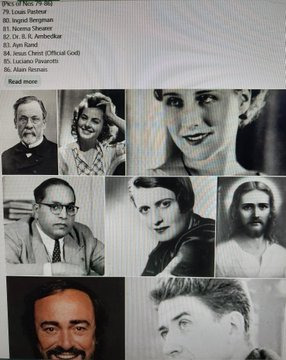
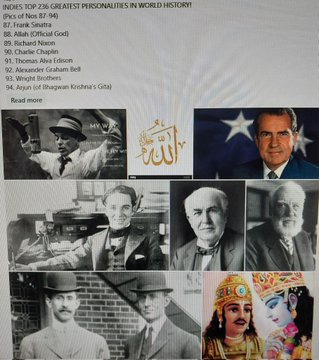
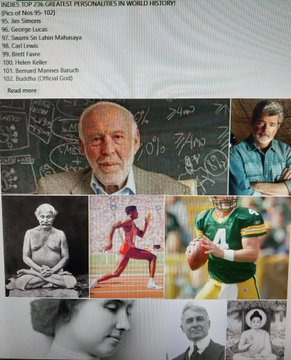
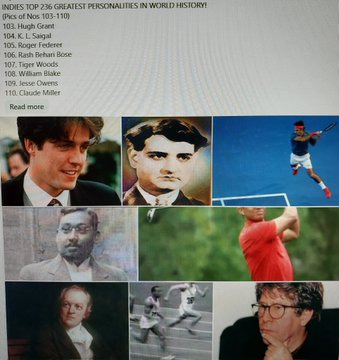
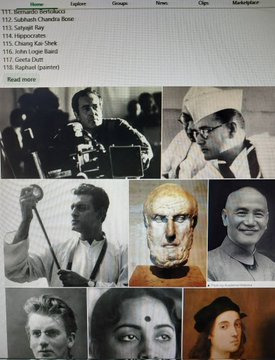
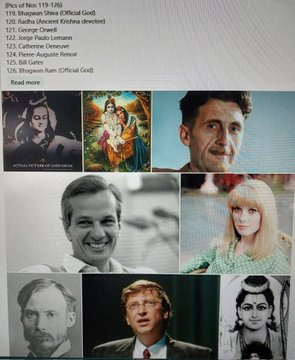
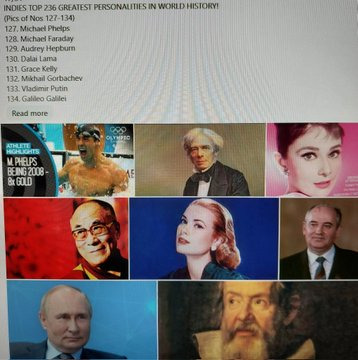
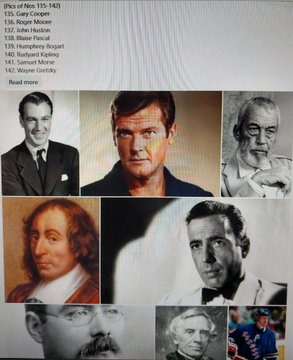
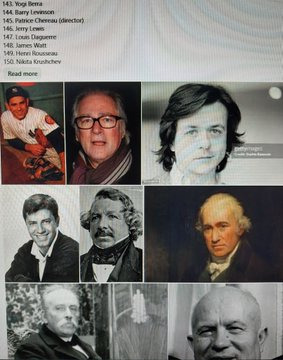
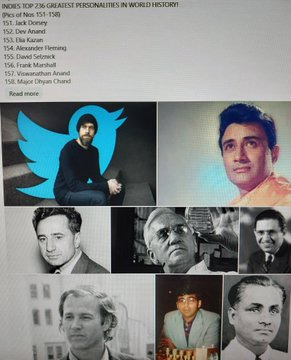
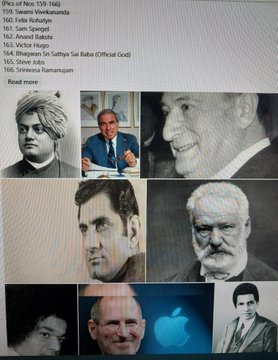
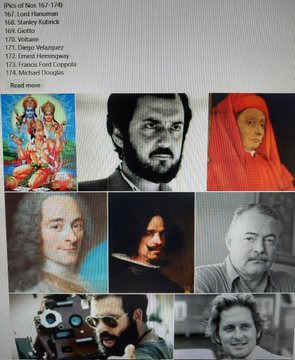

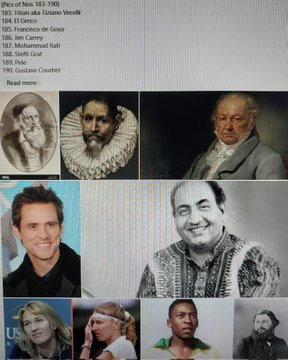
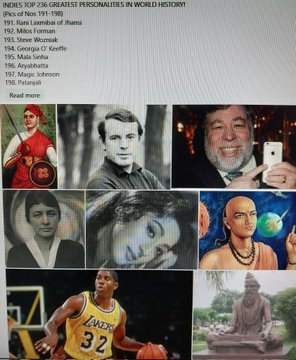
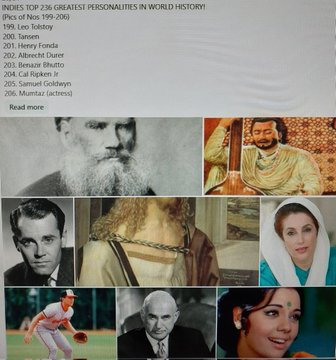
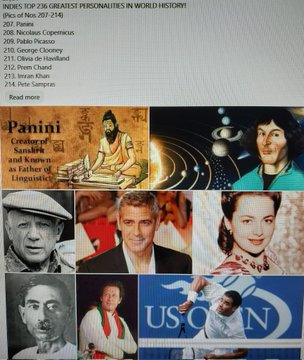
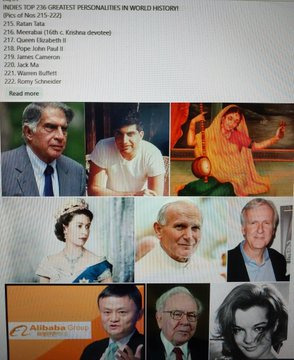
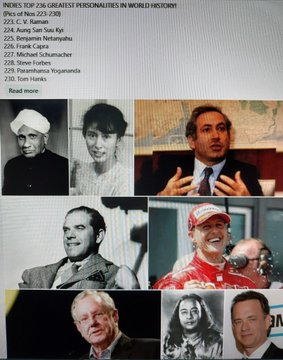
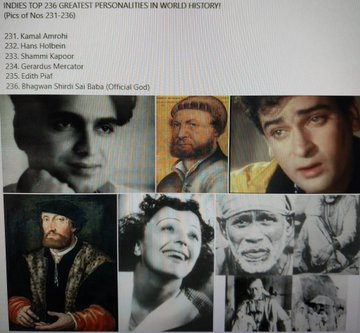
2 notes
·
View notes
Text
THE 236 GREATEST PERSONALITIES IN THE ENTIRE KNOWN HISTORY/COLLECTIVE CONSCIOUSNESS OF THIS WORLD! (@INDIES)
i.e. THE 236 GREATEST PERSONALITIES IN WORLD HISTORY! (@INDIES)
Rajesh Khanna
Lionel Messi
Leonardo Da Vinci
Muhammad Ali
Joan of Arc
William Shakespeare
Vincent Van Gogh
Online Indie
J. K. Rowling
David Lean
Nadia Comaneci
Diego Maradona
Wolfgang Amadeus Mozart
Meena Kumari
Julius Caesar
Harrison Ford
Ludwig Van Beethoven
William W. Cargill
Fritz Hoffmann-La Roche
Samuel Curtis Johnson
Sam Walton
John D. Rockefeller
Andrew Carnegie
Roy Thomson
Tim Berners-Lee
Marie Curie
James J. Hill
Cornelius Vanderbilt
Roman Polanski
Samuel Slater
J. P. Morgan
Cary Grant
Dmitri Mendeleev
John Harvard
Alain Delon
Ramakrishna Paramhansa (Official God)
The Lumiere Brothers, Auguste & Louis
Carl Friedrich Benz
Michelangelo
Maharishi Mahesh Yogi
Ramana Maharishi
Mark Twain
Swami Sri Yukteswar Giri
Bruce Lee
Bhagwan Krishna (Official God)
Charlemagne
Rene Descartes
John F. Kennedy
Bhagwan Ganesha (Official God)
Walt Disney
Albert Einstein
Nikola Tesla
Alfred Hitchcock
Pythagoras
William Randolph Hearst
Cosimo de’ Medici
Johann Sebastian Bach
Alec Guinness
Nostradamus
Christopher Plummer
Archimedes
Jackie Chan
Guru Dutt
Amma Karunamayi/ Mata Parvati (Official God)
Peter Sellers
Gerard Depardieu
Joseph Safra
Robert Morris
Sean Connery
Petr Kellner
Aristotle Onassis
Usain Bolt
Jack Welch
Alfredo di Stefano
Elizabeth Taylor
Michael Jordan
Paul Muni
Steven Spielberg
Louis Pasteur
Ingrid Bergman
Norma Shearer
Dr. B. R. Ambedkar
Ayn Rand
Jesus Christ (Official God)
Luciano Pavarotti
Alain Resnais
Frank Sinatra
Allah (Official God)
Richard Nixon
Charlie Chaplin
Thomas Alva Edison
Alexander Graham Bell
Wright Brothers
Arjun (of Bhagwan Krishna’s Gita)
Jim Simons
George Lucas
Swami Sri Lahiri Mahasaya
Carl Lewis
Brett Favre
Helen Keller
Bernard Mannes Baruch
Buddha (Official God)
Hugh Grant
K. L. Saigal
Roger Federer
Rash Behari Bose
Tiger Woods
William Blake
Jesse Owens
Claude Miller
Bernardo Bertolucci
Subhash Chandra Bose
Satyajit Ray
Hippocrates
Chiang Kai-Shek
John Logie Baird
Geeta Dutt
Raphael (painter)
Bhagwan Shiva (Official God)
Radha (Ancient Krishna devotee)
George Orwell
Jorge Paulo Lemann
Catherine Deneuve
Pierre-Auguste Renoir
Bill Gates
Bhagwan Ram (Official God)
Michael Phelps
Michael Faraday
Audrey Hepburn
Dalai Lama
Grace Kelly
Mikhail Gorbachev
Vladimir Putin
Galileo Galilei
Gary Cooper
Roger Moore
John Huston
Blaise Pascal
Humphrey Bogart
Rudyard Kipling
Samuel Morse
Wayne Gretzky
Yogi Berra
Barry Levinson
Patrice Chereau (director)
Jerry Lewis
Louis Daguerre
James Watt
Henri Rousseau
Nikita Krushchev
Jack Dorsey
Dev Anand
Elia Kazan
Alexander Fleming
David Selznick
Frank Marshall
Viswanathan Anand
Major Dhyan Chand
Swami Vivekananda
Felix Rohatyn
Sam Spiegel
Anand Bakshi
Victor Hugo
Bhagwan Sri Sathya Sai Baba (Official God)
Steve Jobs
Srinivasa Ramanujam
Lord Hanuman
Stanley Kubrick
Giotto
Voltaire
Diego Velazquez
Ernest Hemingway
Francis Ford Coppola
Michael Douglas
Kirk Douglas
Mario Lemieux
Kishore Kumar
James Stewart
Douglas Fairbanks
Confucius
Babe Ruth
Raj Kapoor
Titian aka Tiziano Vecelli
El Greco
Francisco de Goya
Jim Carrey
Mohammad Rafi
Steffi Graf
Pele
Gustave Courbet
Rani Laxmibai of Jhansi
Milos Forman
Steve Wozniak
Georgia O’ Keeffe
Mala Sinha
Aryabhatta
Magic Johnson
Patanjali
Leo Tolstoy
Tansen
Henry Fonda
Albrecht Durer
Benazir Bhutto
Cal Ripken Jr
Samuel Goldwyn
Mumtaz (actress)
Panini
Nicolaus Copernicus
Pablo Picasso
George Clooney
Olivia de Havilland
Prem Chand
Imran Khan
Pete Sampras
Ratan Tata
Meerabai (16th c. Krishna devotee)
Queen Elizabeth II
Pope John Paul II
James Cameron
Jack Ma
Warren Buffett
Romy Schneider
C. V. Raman
Aung San Suu Kyi
Benjamin Netanyahu
Frank Capra
Michael Schumacher
Steve Forbes
Paramhansa Yogananda
Tom Hanks
Kamal Amrohi
Hans Holbein
Shammi Kapoor
Gerardus Mercator
Edith Piaf
Bhagwan Shirdi Sai Baba (Official God)
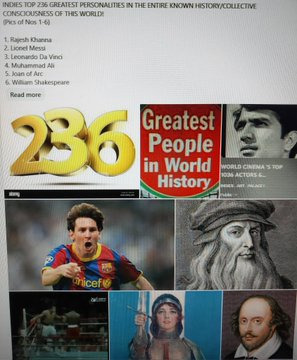


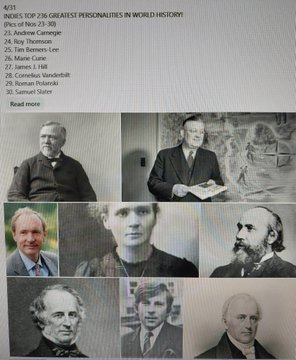
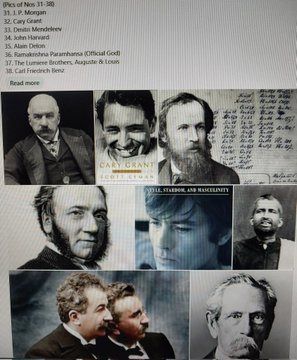
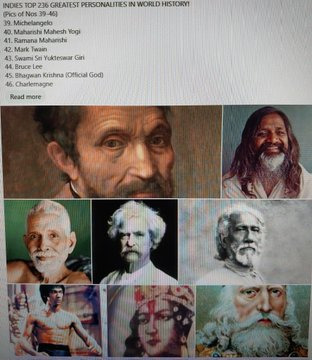
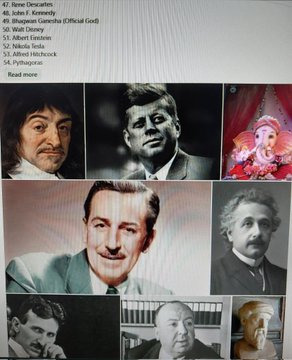
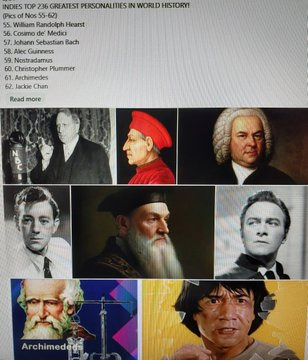
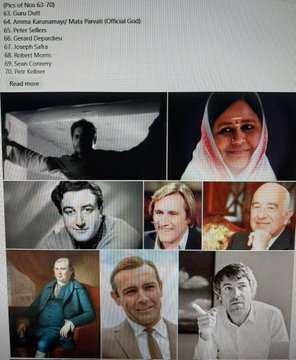
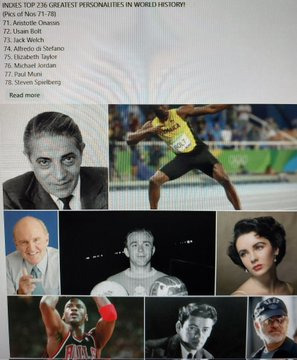
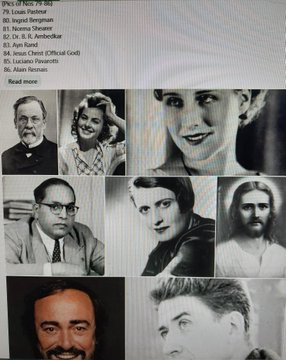
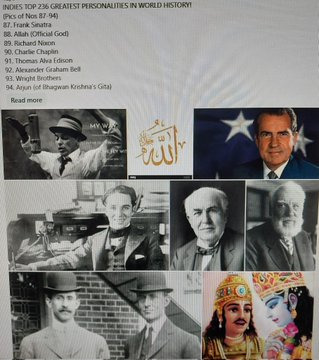
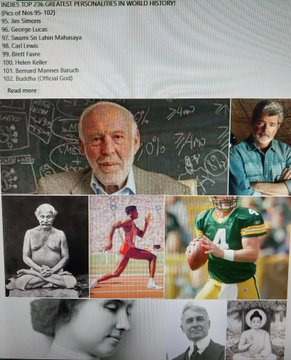
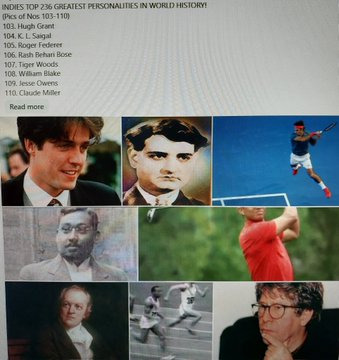
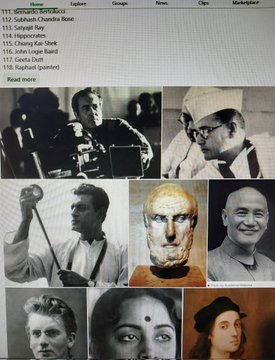
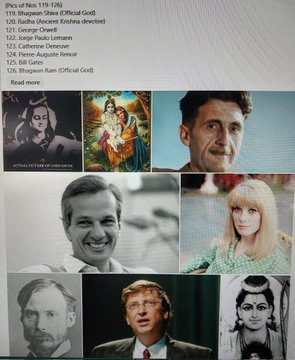
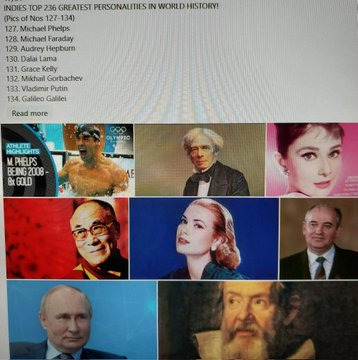
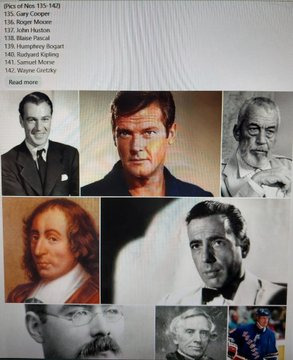
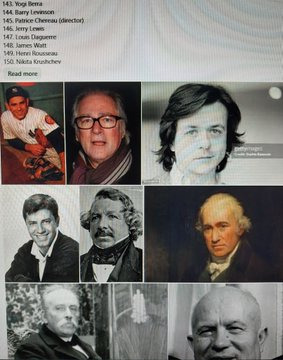
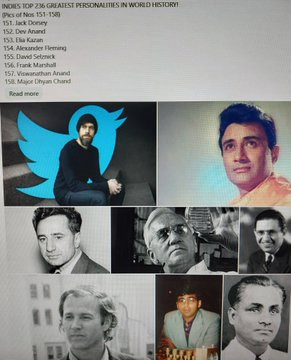
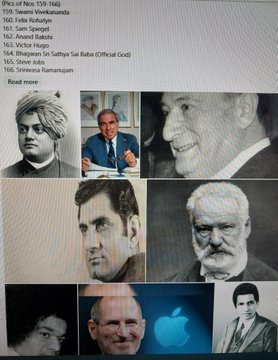
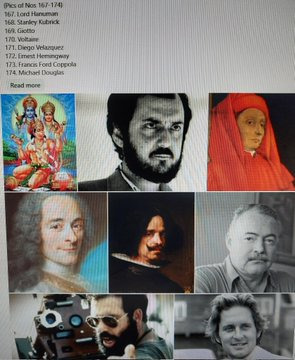

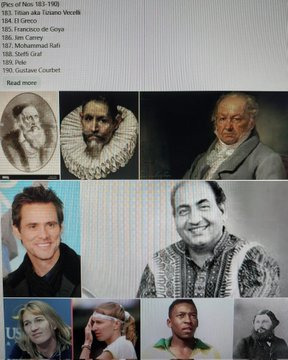
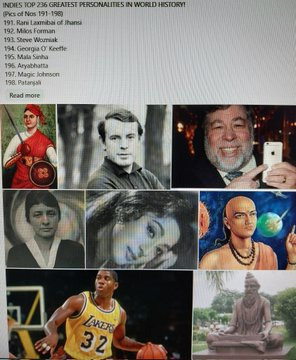
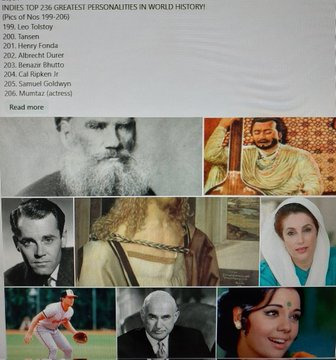

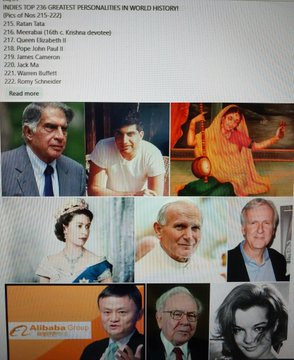
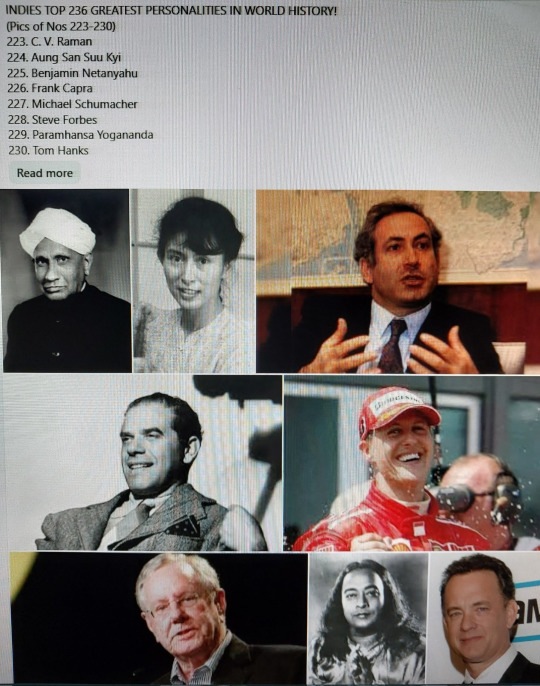
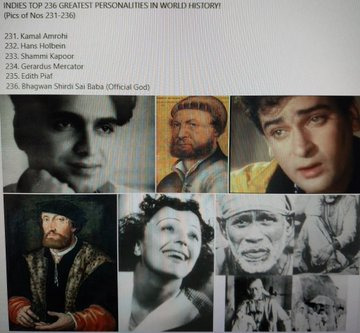
4 notes
·
View notes
Text
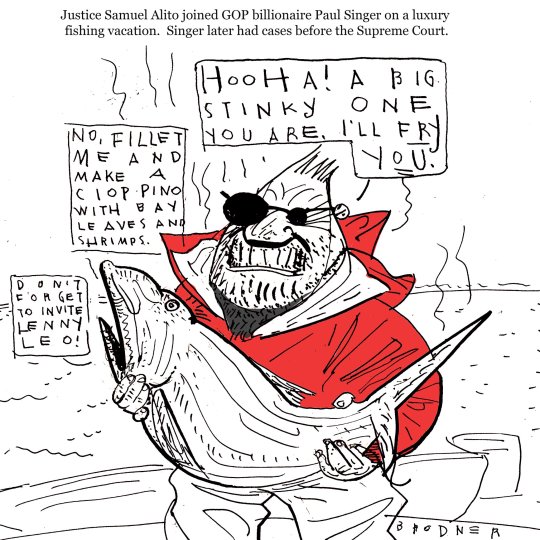
Steve Brodner
* * * *
LETTERS FROM AN AMERICAN
June 21, 2023
HEATHER COX RICHARDSON
JUN 22, 2023
Just before midnight yesterday, ProPublica reporters Justin Elliott, Joshua Kaplan, and Alex Mierjeski published a story reporting that Supreme Court Justice Samuel Alito in 2008 flew on a private jet to a luxury fishing vacation in Alaska thanks to the hospitality of hedge fund billionaire Paul Singer, whose business was based on hard-hitting litigation. Since that trip, Singer has had that litigation before the Supreme Court at least ten times. Alito neither disclosed the gift of the flight on the private jet nor recused himself from ruling on those cases.
In the last decade, according to the authors, Singer has donated more than $80 million to Republican political groups. While in Alaska, Alito stayed as a guest at the lodge of another wealthy Republican donor, who had, in the past, entertained former Supreme Court Justice Antonin Scalia. Lodging there cost $1000 a night.
This revelation adds to the many recently-revealed ties between the court’s right-wing justices and wealthy donors. In April, ProPublica, which is a nonprofit newsroom that focuses on abuses of power, began a series revealing that Justice Clarence Thomas had accepted lavish gifts from Texas billionaire and Republican megadonor Harlan Crow, as well as private school tuition for a relative and real estate deals. Thomas did not disclose those gifts.
Then it turned out that the wife of Chief Justice John Roberts made more than $10 million in commissions over 8 years as she matched top lawyers with top law firms, including some that brought cases before the court. Roberts misleadingly disclosed the money as “salary” rather than commissions. Then news broke that nine days after Justice Neil Gorsuch was confirmed to the court, a property in which he held an interest sold after two years on the market. The buyer was the chief executive of Greenberg Traurig, a law firm that routinely practices before the court. Gorsuch did not disclose the buyer’s identity.
Last night’s story got weirder, though, because Alito waded into it to attack ProPublica for their reporting. The reporters had reached out to the justice last week to get his side of the story. Yesterday, Alito’s office told the authors he had no comment and then several hours later—before the ProPublica story dropped—Alito published in the Wall Street Journal an op-ed “prebuttal” of what was to come. It was titled: “ProPublica Misleads Its Readers.”
Alito didn’t deny that he had accepted the gifts, but claimed that he didn’t need to disclose the valuable flight because it was a “facility” and that the vacation did not involve $1,000 bottles of wine (remember that no one had yet read the ProPublica story, which quoted one of the lodge’s fishing guides as saying that a member of Alito’s party said the wine they were drinking cost $1,000 a bottle). He also said he did not know Singer was associated with the cases before the court.
Today Leonard Leo, the person who organized the 2008 fishing trip, also jumped in. In 2008, Leo was the head of the Federalist Society, which came together in 1982 to roll back the business regulations and the civil rights legislation of the post–World War II era by remaking the courts with judges who stood against what they called “judicial activism.” (Leo is now in charge of Marble Freedom Trust, a nonprofit organized in May 2020 with a $1.6 billion donation from donor Barre Seid to push right-wing politics at every level.)
Leo released a statement supporting Alito and warning: “We all should wonder whether this recent rash of ProPublica stories questioning the integrity of only conservative Supreme Court Justices is bait for reeling in more dark money from woke billionaires who want to damage this Supreme Court and remake it into one that will disregard the law by rubber stamping their disordered and highly unpopular cultural preferences.” (Justice Elena Kagan, one of the justices Leo suggests is being unfairly given a pass by ProPublica, reportedly declined to accept a basket of bagels and lox from her high-school classmates out of concern about the ethics of accepting gifts.)
Josh Marshall of Talking Points Memo observed that Leo seems to have used his extensive network to set up relationships between judges and donors in a reinforcing ecosystem.
This is, of course, precisely why there is pressure on the Supreme Court to adopt ethics reform. In April, Senators Angus King (I-ME) and Lisa Murkowski (R-AK) introduced the Supreme Court Code of Conduct Act, which would simply ask the court to develop its own code of conduct and oversight, a system that, unlike every other state and federal court, it does not currently have. That measure remains in committee.
But the day had just begun. John Durham, appointed as special counsel by Trump attorney general William Barr on October 19, 2020, to investigate the behavior of federal investigators who examined the ties between the 2016 Trump campaign and Russian operatives, testified for over six hours today before the House Judiciary Committee. While Trump and his loyalists repeatedly predicted Durham would find damning evidence against the investigators, in fact his 306-page report, released on May 15 after a four-year, $6.5 million investigation, simply said the FBI should have launched a preliminary investigation rather than a full investigation (a 2019 report by the Justice Department’s inspector general concluded the opposite).
There was little new information presented in the hearing, although Durham did answer a question from Representative Zoe Lofgren (D-CA) about the report that when Durham and Barr had asked Italian officials for evidence in favor of Trump, they had instead passed on information that implicated Trump in financial crimes. Durham responded, “The question’s outside the scope of what I think I’m authorized to talk about—it’s not part of the report,” but added: “I can tell you this. That investigative steps were taken, grand jury subpoenas were issued and it came to nothing.”
The hearing served mostly to keep the Russia investigation in front of the public, which appears to be important to the former president and his allies as they continue to attack the FBI and the Justice Department. But Democrats on the committee pressed Durham on the facts of the Russia investigation itself, and he, seemingly somewhat reluctantly, agreed under oath in response to questions by Representative Adam Schiff (D-CA) that the facts of the Mueller report and the Senate Intelligence Committee report were correct: Russia interfered in the 2016 election for the benefit of Trump, Trump’s campaign welcomed the help and shared information and secret meetings with Russian operatives, and the FBI was justified in investigating that interference.
Also significant in the hearing was the prominence of Schiff, who was the House manager for Trump’s first impeachment trial. That effort earned him Trump’s fury, and Trump loyalists today demanded a vote on the motion by Representative Anna Paulina Luna (R-FL) to censure Schiff.
Notwithstanding Durham’s sworn testimony, House Resolution 521 began: “Whereas the allegation that President Donald Trump colluded with Russia to interfere in the 2016 Presidential election has been revealed as false by numerous in-depth investigations, including the recent report by Special Counsel John Durham….”
The resolution was a red-meat pro-Trump document, insisting that the Trump campaign did not work with the Russians, that Schiff “misled the public” over Trump’s call asking for a “favor” from Ukraine president Volodymyr Zelensky, and that, as then-chair of the Intelligence Committee, Adam Schiff must be censured “for misleading the American public and for conduct unbecoming of an elected Member of the House of Representatives.” It also requires the Ethics Committee to “conduct an investigation into…Schiff’s falsehoods, misrepresentations, and abuses of sensitive information.”
On social media, Trump had called for primary challengers against any Republican who voted against the censure. The Republicans fell into line. During the debate, former House speaker Nancy Pelosi (D-CA) said: “The other side has turned this chamber...into a puppet show. A puppet show, and you know what? The puppeteer, Donald Trump, is shining a light on the strings. You look miserable. Miserable.” The final vote was 213 to 209, with 6 representatives voting present. When the motion passed, the House Democrats erupted into chants of “Shame” and “Disgrace.”
Owen Tucker-Smith of the Los Angeles Times noted that in the past 40 years, the House has censured just five people: Paul Gosar (R-AZ) in 2021 for tweeting a video showing a character with his face killing Representative Alexandria Ocasio-Cortez (D-NY) and attacking President Biden, Charles Rangel (D-NY) in 2010 for finance violations, Gerry Studds (D-MA) and Dan Crane (R-IL) in 1983 for sexual misconduct with House pages, and now Schiff.
Earlier today, Schiff had his own take on his censure: “To my Republican colleagues who introduced this resolution, I thank you,’ he said. “You honor me with your enmity. You flatter me with this falsehood. You, who are the authors of a big lie about the last election, must condemn the truth-tellers and I stand proudly before you. Your words tell me that I have been effective in the defense of our democracy and I am grateful.”
—
LETTERS FROM AN AMERICAN
HEATHER COX RICHARDSON
#Corrupt SCOTUS#Corruption#Sam Alito#letters from an american#Heather Cox Richardson#political#Adam Schiff#shame#Disgrac#TFG
2 notes
·
View notes
Text

By Thomas B. Edsall
In the world of political fund-raising, there is hard money, soft money, dark money — and Leonard Leo money.
Political advocacy and charitable groups controlled by Leo now have far more assets than the combined total cash on hand of the Republican and Democratic National, Congressional and Senatorial committees: $440.9 million.
Leo is a 58-year-old graduate of Cornell Law School, a Catholic with ties to Opus Dei — the most conservative “personal prelature” in the church hierarchy — chief strategist of the Federalist Society for more than a quarter century and a crucial force behind the confirmations of John Roberts, Samuel Alito, Neil Gorsuch, Brett Kavanaugh and Amy Coney Barrett. He has emerged over the past five years as the dominant fund-raiser on the right.
As Leo has risen to this pinnacle of influence, he has become rich, profiting from the organizations he has created and from the consulting fees paid by the conservative advocacy and lobbying groups he funds.
Leo has an overarching agenda. In a 2022 speech he made upon receiving the John Paul II New Evangelization Award at the Catholic Information Center, he warned fellow Catholics: “Catholic evangelization faces extraordinary threats and hurdles. Our culture is more hateful and intolerant of Catholicism than at any other point in our lives. It despises who we are, what we profess and how we act.”
Leo describes the adversaries of Catholicism as “these barbarians, secularists and bigots” who “have been growing more numerous over the past few years. They control and use many levers of power.” He is determined to wrest the levers of power from “the grasp of liberals” and place them, permanently if possible, with those he sees as their rightful owner: social and economic conservatives.
Leo has most famously used his network and personal influence not only to establish a 6-3 conservative majority on the Supreme Court but also to secure appointment of deeply conservative justices throughout the federal and state court systems.
At the same time, Leo has provided essential support to the full gamut of right-wing advocacy and lobbying organizations, including the Federalist Society, Susan B. Anthony Pro-life America and the Faith and Freedom Coalition.
The millions of dollars Leo has raised through his tax-exempt nonprofits have, in turn, flowed to profit-making consulting companies owned, in part or wholly, by him. In 2016, he created the BH Group, a for-profit consulting firm that is now defunct, whichreceived at least $6.9 million from tax- exempt donor nonprofits run by him.
Four years later, Leo formed CRC Advisors, also a profit-making consulting firm. Since then, two of his tax-exempt donor organizations, the 85 Fund and the Concord Fund, have paid CRC Advisors more than $77 million, according to reports filed with the I.R.S.
Leo is a prodigious fund-raiser whose organizations take in and hand out hundreds of millions annually. For example, the 85 Fund, according to the I.R.S., raised $317.9 million from 2020 to 2022 and gave out grants totaling $147.4 million. During that same period, the 85 Fund paid CRC Advisors — of which Leo is chairman — fees totaling $55.2 million, according to I.R.S. filings and research by Accountable.us and ProPublica.
Similarly, the Concord Fund raised $150.7 million from 2020 to 2023 and awarded grants totaling $96.8 million, according to the I.R.S., and the Concord Fund paid CRC Advisors a total of $21.9 million.
In effect, Leo has created for himself and his for-profit partners at CRC Advisors a lucrative business model.
In 2021, Leo was the recipient of what is believed to be the single largest contribution to a politically oriented advocacy group: $1.6 billion from Barre Seid, an obscure but very wealthy Chicago electronics manufacturer. Leo used the money to create the Marble Freedom Trust, which had assets of more than $1 billion in April 2023, according to its most recent I.R.S. filing. That report shows that it gave $153.8 million to Schwab Charitable, $55.5 million to Leo’s Concord Fund and $7.6 million to the Knights of Columbus Charitable Fund.
The vast sums under Leo’s command have elevated him to the highest echelons of conservative influence and power.
Tracking payments to CRC Advisors from groups supported by Leo’s three major charities is particularly difficult because of his deliberate secretiveness. For a majority of grants, Leo uses specific “donor-advised funds,” or pass-throughs — vehicles designed to prevent the public from knowing who the beneficiaries of his largess are. Over the three years covered in the most recent I.R.S. reports, Leo’s charities channeled a total of $325.5 million through Schwab Charitable and $216.7 million through Donors Trust.
Leo or his designated representative can direct Schwab or Donors Trust to make contributions to specific groups, but those groups remain largely out of public view.
Here is how Donors Trust describes its services:
In today’s polarized climate, many conservative and libertarian donors worry about being able to manage their charitable giving in a way that aligns with their values. We help donors like you to have a positive, principled impact with your giving in a private, tax-friendly way. We are a charitable partner that not only understands your commitment to liberty but shares it, too.
The Donor Trust lists the grants it makes without identifying the source of the money. A quick scan of the groups receiving money from the Donor Trust in 2021 and 2022 includes many entities that Leo has publicly supported, including the Competitive Enterprise Institute, $1.3 million; the Constitutional Defense Fund, $7.4 million; the Foundation for Government Accountability, $2.5 million; the State Policy Network, $17.4 million; the Federalist Society, $3.7 million; and Teneo Network, $6 million.
A second factor contributing to the opacity of financial transactions involving Leo’s donor organizations and the groups they fund is that they are not required to file timely reports. Instead, many tax-exempt groups file reports with the I.R.S. in November for the previous year. So the most recent filings for many of these organizations is November 2023 for information on activities in 2022, now nearly two years out of date.
By email, I asked Leo a series of questions about his financial transactions, including:
Can you explain what CRC Advisors did for the $6,058,832 in 2023, the $3,757,454 paid in 2022, the $7,679,331 in 2021 by the Concord Fund? What did CRC Advisors do for the 85 Fund after receiving payments of $21,360,985 in 2022, $21,715,382 in 2021, and $12,117,335 in 2020? Do these payments from 501(c)(3) and 501(c)(4) charities, which are controlled by you, to CRC Advisors — a for-profit consulting firm that you chair — amount to self-dealing, in violation of tax law? If not, what justifies these payments? I know you have dismissed these concerns as baseless, but could you explain how they are baseless? In addition to the payments to CRC Advisors from the Leo-Leonard-run donor groups, many of the groups that have received payments from the 85 Fund, the Concord Fund and the Marble Trust have hired CRC Advisors. What services do you provide these groups? Do you assist them in making grant applications to your donor groups?
In his emailed reply, Leo argued that all payments were legitimate and based on the quality of the product clients received:
CRC Advisors is a firm that employs over 100 best-in-class professionals who provide an unsurpassed level of value and impact through an all-encompassing suite of services, including program and events management, content creation, research, and all aspects of public affairs. Our fees and services are based on a rigorous compliance system that is established and managed by leading legal counsel, accountants, and management and compensation consultants. We are paid less for more than our progressive rivals, and the nonprofit clients we work with are governed by independent boards. We are happy to have these standards judged against the progressives’ Arabellaand Tides networks, or any other enterprise that is similar to us.
In May 2019, Leo told The Washington Post: “I don’t waste my time on stories that involve money and politics because what I care about is ideas.”
Despite the disclosure limitations surrounding the money flowing through the donor-advised funds, Leo’s charities do list some of their grantees, and some of those grantees, in turn, disclose payments to CRC Advisors on their reports to the I.R.S.
The tax filings from 2020 to 2023 show, for example, that Leo’s donor groups gave Susan B. Anthony Pro-Life America at least $12 million. In its most recent tax filing, the Anthony group reported that it paid CRC Advisors $543,821 for “public relations consulting.”
Leo’s charities have given the Foundation for Government Accountability at least $2 million. From 2020 to 2022, the accountability foundation told the I.R.S. that it paid CRC Advisors $640,000 for “public relations.”
Or take the Federalist Society, the conservative legal think tank. Leo was formerly the vice president and is now a co-chairman of its board. His donor nonprofits have given it at least $15.5 million during the 2020s, according to tax records. In its most recent filingswith the I.R.S., the Federalist Society reported paying CRC Advisors $4.78 million from 2020 to 2022.
Last week, Hans Nichols, a reporter at Axios, published a letterLeo wrote to the recipients of grants from the 85 Fund. It said in part:
“Conservative philanthropy is too heavily weighted in the direction of ‘ideation’ — the development of and education about conservative ideas and policies. In contrast, vastly insufficient funds are going toward operationalizing and weaponizing those ideas and policies to crush liberal dominance at the choke points of influence and power in our society.”
To counter this misallocation of right-wing money, Leo told the grantees, “If others are not going to devote funding to operationalize or weaponize the conservative vision, then the 85 Fund needs to weight its support much more heavily in that direction and much less in the direction of research, policy and general education.”
The 85 Fund, Leo continued, “intends to gap-fill by placing much, much greater emphasis on projects and leaders that operationalize or weaponize ideas and policies.”
For beneficiaries of Leo’s grant-making organization struggling to figure out how to “operationalize or weaponize” ideas and policies, what better place is there than CRC Advisors to get guidance?
Leo’s financial activities have been subject to repeated investigations by such liberal groups as True North Research, which has released several studies; Accountable.us, which has also put Leo under the magnifying glass; and the Campaign for Accountability.
In April 2023, the Campaign for Accountability filed a complaintwith the I.R.S. seeking an investigation into seven Leo-affiliated organizations in order to determine
whether the Leo-affiliated nonprofits have diverted substantial portions of their income and assets, directly or indirectly, to the personal benefit of Leonard Leo. Most of these entities have either made substantial independent contractor payments to one or more of his for-profit business entities or made major contributions to other Leo-affiliated nonprofits that made such payments. Such payments were generally listed as made in exchange for alleged consulting, research, public relations, or similar services; however, CFA has reasonable questions about whether those alleged services were actually rendered at all or, if services were rendered, whether the payments made were substantially in excess of the fair market value of those services.
The Campaign for Accountability, in its complaint, cited investigative reporting by Heidi Przybyla of Politico about Leo’s growing affluence: “Beginning in 2016, coinciding with the multimillion-dollar payments paid to BH Group, Leonard Leo began living more lavishly. In 2017, Leonard Leo pledged to donate $1 million to Vatican initiatives worldwide.”
I asked Philip Hackney, a former I.R.S. expert in the law governing tax-exempt groups who is now a law professor at the University of Pittsburgh, about Leo’s involvement with tax-exempt and for-profit groups.
In a phone interview, Hackney said the crucial issue when examining situations like Leo’s is whether the fees paid to his for-profit firms are “a fair amount for the services he is rendering.” The $77 million paid to CRC Advisors by Leo’s charitable funds “seems like a lot,” Hackney said.
Hackney noted, however, that when the I.R.S. seeks remedies in such cases, “it’s a hard battle to win” because the judgment of a fair price is subject to so many different interpretations, many of them subjective.
Marcus Owens, a former director of the I.R.S. Exempt Organizations Division — who is now a co-chair for nonprofits and tax-exempt organizations at the Washington law firm Loeb & Loeb — wrote by email:
There are, indeed, federal tax rules that govern related party transactions, particularly when the transactions involve a “disqualified person,” the phrase Congress used when it enacted section 4958 of the Internal Revenue Code back in 1986 to refer to an insider with the ability to wield influence over an organization that is exempt from federal income tax under either section 501(c)(3) or section 501(c)(4). For example, the Marble Trust and the Concord Fund are exempt under section 501(c)(4), while the 85 Fund is exempt under section 501(c)(3). Insider transactions that result in the insider receiving an excessive return, i.e., one that is greater than what fair market terms and conditions would provide, can lead to loss of tax-exempt status or the imposition of a penalty excise tax on the insider of 25 percent of the excessive amount, or both. Fair market terms and conditions are defined as what similar organizations would pay for similar goods or services under similar circumstances, a standard that encourages creative expression by attorneys and accountants.
While Leo has reached a pinnacle of power, he still has a lot riding on the outcome not only of the presidential election but also of the battle for control of the Senate.
Capturing the presidency is important to Leo not only for policy and ideological reasons, but also because, if Donald Trump is elected, he will appoint the next I.R.S. commissioner. It would be very unlikely that such an appointee would pursue an investigation into Leo’s finances.
Control of the Senate is also crucial because the Democratic-controlled Judiciary Committee last year subpoenaed Leo to talk about whether he was involved in gifts to members of the Supreme Court by prominent Republican donors.
In April, Leo declared that he was refusing to comply with the subpoena. “I am not capitulating,” he told reporters, to “Senator Sheldon Whitehouse and the left’s dark money effort to silence and cancel political opposition.”
Since then, the Senate Democratic leadership has been reluctant to try to enforce the subpoena — a virtually impossible task since it would require overcoming a filibuster. If Democrats retain control after the coming elections, they will be under considerable pressure to change the filibuster rules, raising the possibility that Leo could be forced to testify under oath about his activities.
The chances of that happening are, however, slim at best. The most likely outcome of the controversies surrounding Leo is that he will continue, unabated, in his drive to make America great again by devoting vast sums, relentless pressure and every kind of imaginable financial ingenuity to alter the balance of power and push America ever further to the right.
0 notes
Text
Aout MMXXIV
Films
Le Gendarme en balade (1970) de Jean Girault avec Louis de Funès, Michel Galabru, Jean Lefebvre, Christian Marin, Guy Grosso, Michel Modo, Claude Gensac, France Rumilly, Nicole Vervil et Dominique Davray
Ali (2001) de Michael Mann avec Will Smith, Jon Voight, Jamie Foxx, Mario Van Peebles, Ron Silver, Jeffrey Wright et Nona Gaye
Les Enchaînés (Notorious) (1946) d'Alfred Hitchcock avec Cary Grant, Ingrid Bergman, Claude Rains, Louis Calhern, Leopoldine Konstantin et Reinhold Schünzel
Lettre d'une inconnue (Letter from an Unknown Woman) (1948) de Max Ophüls avec Joan Fontaine, Louis Jourdan, Art Smith, Leo B. Pessin, Marcel Journet, Mady Christians, Howard Freeman et Sonja Bryden
Lucky Jo (1964) de Michel Deville avec Eddie Constantine, Pierre Brasseur, Françoise Arnoul, Georges Wilson, Christiane Minazzoli, Claude Brasseur, Jean-Pierre Darras et André Cellier
Borg McEnroe (2017) de Janus Metz Pedersen avec Sverrir Gudnason, Shia LaBeouf, Stellan Skarsgård, Tuva Novotny, Scott Arthur, Robert Emms et David Bamber
La Vérité (1960) de Henri-Georges Clouzot avec Brigitte Bardot, Sami Frey, Marie-José Nat, Charles Vanel, Paul Meurisse, Louis Seigner, René Blancard et Colette Castel
Zack Snyder's Justice League (2021) de Zack Snyder avec Ben Affleck, Gal Gadot, Ray Fisher, Jason Momoa, Ezra Miller, Henry Cavill, Amy Adams, Jeremy Irons et Diane Lane
La Chèvre (1981) de Francis Veber avec Pierre Richard, Gérard Depardieu, Michel Robin, Corynne Charby, André Valardy, Pedro Armendáriz Jr. et Jorge Luke
Piège de cristal (Die Hard) (1988) de John McTiernan avec Bruce Willis, Alan Rickman, Alexander Godunov, Bonnie Bedelia, Reginald VelJohnson, Paul Gleason et William Atherton
Le Samouraï (1967) de Jean-Pierre Melville avec Alain Delon, François Périer, Nathalie Delon, Cathy Rosier, Jacques Leroy et Jacques Deschamps
La Piscine (1969) de Jacques Deray avec Alain Delon, Romy Schneider, Maurice Ronet, Jane Birkin, Paul Crauchet, Suzie Jaspard et Steve Eckart
Forfaiture (1937) de Marcel L'Herbier avec Louis Jouvet, Lise Delamare, Ève Francis, Sylvia Bataille, Victor Francen, Sessue Hayakawa et Lucas Gridoux
The Batman (2022) de Matt Reeves avec Robert Pattinson, Zoë Kravitz, Paul Dano, Jeffrey Wright, Colin Farrell, John Turturro, Andy Serkis
Plein Soleil (1960) de René Clément avec Alain Delon, Marie Laforêt, Maurice Ronet, Erno Crisa, Elvire Popesco, Frank Latimore et Billy Kearns
58 Minutes pour vivre (Die Hard 2) (1990) de Renny Harlin avec Bruce Willis, Bonnie Bedelia, William Sadler, Dennis Franz, Franco Nero, William Atherton, Reginald VelJohnson, Fred Thompson, Art Evans, John Amos, Tom Bower et Sheila McCarthy
Mort d'un pourri (1977) de Georges Lautner avec Alain Delon, Ornella Muti, Stéphane Audran, Mireille Darc, Maurice Ronet, Michel Aumont, Jean Bouise, Daniel Ceccaldi, Julien Guiomar et Klaus Kinski
The Layover (2017) de William H. Macy avec Alexandra Daddario, Kate Upton, Matt Barr, Matt L. Jones, Rob Corddry, Kal Penn et Molly Shannon
Une journée en enfer (Die Hard with a Vengeance) (1995) de John McTiernan avec Bruce Willis, Jeremy Irons, Samuel L. Jackson, Larry Bryggman, Graham Greene et Colleen Camp
Séries
Le Coffre à Catch
#179 : Le festival de Kane ! - #180 : Jack Swagger repasse par la ECW ! - #181 : Les adieux de Tommy Dreamer (Colby en fil rouge) - #182 : Bret et Shawn font la paix et on termine le Homecoming!
Castle Saison 7
Sans relâche - Montréal - Une force invisible - Un problème enfantin - Un buzz foudroyant - De parfaits inconnus - Les Mystères de l'Ouest - Chevalier blanc - Action! - Un Noël dans la mafia - Castle, détective privé - L'affaire est dans le sac - Devant mes yeux - Résurrection - Règlement de comptes
The Durrells : une famille anglaise à Corfou Saison 3, 4
Episode 1 - Episode 2 - Episode 3 - Episode 4 - Episode 5 - Episode 6 - Episode 7 - Episode 8 - Episode 1 - Episode 2 - Episode 3 - Episode 4 - Episode 5 - Episode 6
Biography: WWE Legends Saison 3
Paige - Yokozuna
Le Comte de Monte-Cristo
Le Prisonnier du château d'If - Le Revenant - Les Scélérats - La Vengeance
Maguy Saison 7
Suzanne désespérément - OPA comique - Hallali conjugal - Qui l'eût "crue" ? - Dernier de Corday - La mégère à prix Boissier - Absence unique - Un monde chou, chou, chou - Flamme fatale - Le déchargé de mission - Ice-cream et châtiment - L'âge de déraison - Un ome peut en cacher un autre - Maguy rock - Direction assistée - La vie en roses - Le bazar et la nécessité - Le salaire du rappeur - Pas commode d'emploi - Maguyvaudages - Sauve qui puce - SOS vampires - Il est 5 heures, Maguy s'éveille - Certains l'aiment faux
Commissaire Moulin Saison 1
Petite Hantise - Cent mille soleils - Affectation spéciale
Commissaire Dupin
Une famille endeuillée - La morte rose
Affaires sensibles
Bambi, vedette de cabaret et femme ordinaire - Simone Weber, "la diabolique de Nancy"
Spectacles
Adele at the BBC (2015)
ABBA : Live at Wembley Arena (1979)
Bénabar : Live au Grand Rex (2004)
Eddy Mitchell : Ma dernière séance (2011) à l'Olympia
Livres
Les Disparus de Trégastel de Jean-Luc Bannalec
Nota Bene, tome 6 : La Vie au Moyen Âge de Benjamin Brillaud, Phil Castaza, Christian Paty et Mathieu Mariolle
Les Schtroumpfs, tome 11 : Les Schtroumpfs olympiques de Peyo
Astérix, tome 12 : Astérix aux jeux Olympiques de René Goscinny et Albert Uderzo
0 notes
Text
Birthdays 8.15
Beer Birthdays
Adam Eulberg (1835)
Christian Benjamin Feigenspan (1844)
Charles D. Goepper (1860)
Christine Celis (1962)
Five Favorite Birthdays
Julia Child; chef, writer (1912)
Stieg Larsson; Swedish writer (1954)
Jennifer Lawrence; actor (1990)
Oscar Peterson; Canadian jazz pianist (1925)
Walter Scott; Scottish poet, writer (1771)
Famous Birthdays
Ben Affleck; actor (1972)
Tommy Aldridge; drummer (1950)
Ethel Barrymore; actor (1879)
Leonard Baskin; sculptor (1922)
Marion Bauer; composer (1882)
Robert Bolt; English playwright, screenwriter (1924)
Napoleon Bonaparte; French emperor, soldier (1769)
Estelle Brody; silent film actress (1900)
Jim Brothers; sculptor (1941)
Jan Brzechwa; Polish author and poet (1898)
Bobby Byrd; singer-songwriter (1934)
Bobby Caldwell; singer-songwriter (1951)
Cadence Carter; pornstar (1996)
Lillian Carter; Jimmy Carter's mother (1898)
Judy Cassab; Austrian-Australian painter (1920)
Samuel Coleridge-Taylor; English composer (1875)
Tom Colicchio; chef (1962)
Charles Comiskey; baseball player and manager (1859)
Leslie Comrie; New Zealand astronomer (1893)
Mike Connors; actor (1925)
Gerty Cori; Czech-American biochemist and physiologist (1896)
Walter Crane; English artist (1845)
Jim Dale; English actor (1935)
Abby Dalton; actress (1932)
Louis de Broglie; French physicist (1892)
Régine Deforges; French author (1935)
Thomas de Quincey; English writer (1785)
Linda Ellerbee; television journalist (1944)
Edna Ferber; writer (1885)
Eliza Lee Cabot Follen; writer (1787)
Huntz Hall; actor (1919)
Signe Hasso; Swedish-American actress (1915)
Richard F. Heck; chemist (1931)
Bobby Helms; singer (1933)
Natasha Henstridge; actor (1974)
Wendy Hiller; actor (1912)
Wolfgang Hohlbein; German author (1953)
Stix Hooper; jazz drummer (1938)
Jacques Ibert; French composer (1890)
Blind Jack; English engineer (1717)
Tom Johnston; singer-songwriter and guitarist (1948)
Julius Katchen; pianist and composer (1926)
George Klein; Canadian inventor of the motorized wheelchair (1904)
Aleksey Krylov; Russian mathematician and engineer (1863)
T.E. Lawrence; Welsh writer (1888)
Rose Maddox; singer-songwriter and fiddle player (1925)
Rose Marie; comedian, actor (1923)
Debra Messing; actor (1968)
Sami Michael; Iraqi-Israeli author and playwright (1926)
Giorgos Mouzakis; Greek trumpet player (1922)
E. Nesbit; English author and poet (1858)
Pyotr Novikov; Russian mathematician (1901)
Paul Outerbridge; photographer (1896)
Inês Pedrosa; Portuguese writer (1962)
Bill Pinkney, American pop singer (1925)
Luigi Pulci; Italian poet (1432)
Paul Rand; graphic designer (1914)
Nicholas Roeg; film director (1928)
Mike Seeger; folk musician and folklorist (1933)
John Silber; philosopher (1926)
Leo Theremin; Russian inventor (1896)
Rob Thomas; author (1965)
Jack Tworkov; Polish-American painter (1900)
Gene Upshaw; Oakland Raiders G (1945)
Mikao Usui; Japanese spiritual leader, founded Reiki (1865)
Jimmy Webb; songwriter (1946)
Hugo Winterhalter; composer and bandleader (1909)
Peter York; rock drummer (1942)
0 notes
Photo

L'Humanité souffrante, 1914 by Leo Paul Samuel Robert (Swiss, 1851--1923)
425 notes
·
View notes
Photo

Léo-Paul Robert “Raupen des Skabiosen-Scheckenfalters (Euphydryas aurinia) The caterpillars 1923 watercolour
30 notes
·
View notes
Photo

Le ravin - Leo Paul Samuel Robert
215 notes
·
View notes